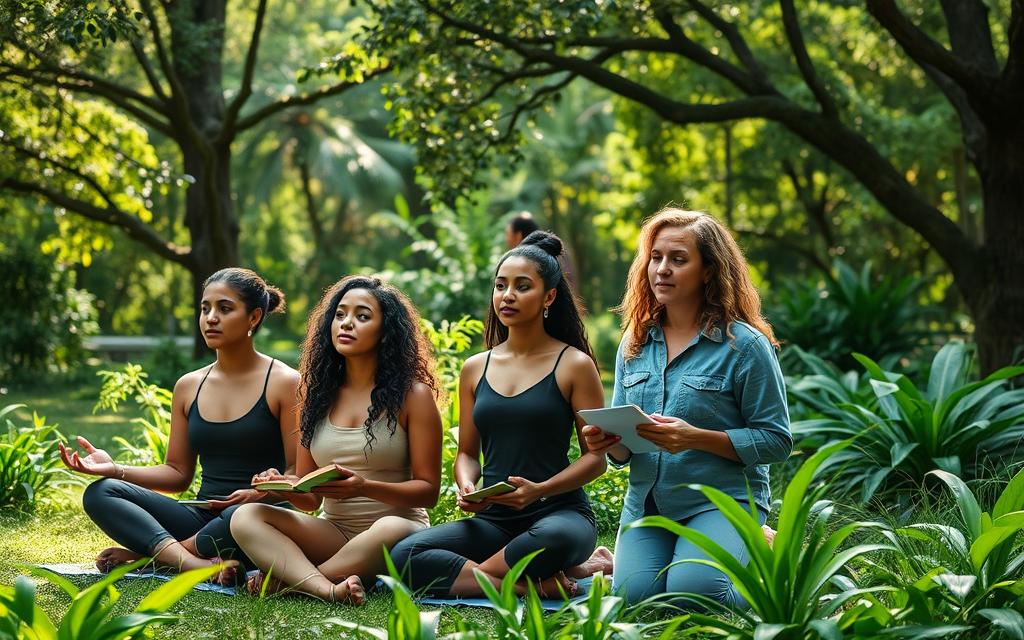Looking out the window, I remember when self-doubt held me back. My inner critic weighed me down, stopping me from reaching my goals. But then, I found the power of self-confidence.
It changed my life in amazing ways. If you struggle with low self-esteem, you’re not alone. Many people have faced these challenges. But, self-confidence can be built with effort and practice.
Self-confidence is more than feeling good about yourself. It’s a powerful tool that opens doors and moves you forward. When you believe in yourself, you’re more likely to take risks and face challenges head-on.
Confident people are flexible, eager to learn, and keep their promises. Whether you want to beat social anxiety, boost your self-esteem, or change your mindset, this article has the tools you need. Start your journey of self-discovery and empowerment today.
Understanding Self-Confidence and Its Importance
Self-confidence is more than just looking good or thinking positively. It’s about feeling good about yourself and what you can do. It’s different from self-esteem, which is about how much you value yourself. Confident people are open, okay with being wrong, and don’t mind asking for help.
They trust themselves to do what they say they will. They see failures as chances to learn and grow.
Defining True Self-Confidence
True self-confidence is more than just a surface-level trait. It’s a deep belief in your own abilities and value. Confident people aren’t arrogant or full of themselves. They just have a strong belief in themselves that lets them take risks and face new challenges.
The Impact on Personal Growth
Self-confidence is key for growing as a person. It lets you set big goals and go after them. When you believe in yourself, you’re more likely to try new things, learn from mistakes, and keep getting better.
This mindset opens up a world of possibilities and helps you grow faster.
Common Characteristics of Confident People
- Flexibility: Confident people are open-minded and adaptable, willing to change course when needed.
- Resilience: They view setbacks as temporary obstacles and are not afraid of being wrong or making mistakes.
- Asking for Help: Confident individuals are comfortable asking for assistance when they need it, recognizing that it’s a sign of strength, not weakness.
- Delivering on Promises: They have faith in their abilities and reliable in following through on their commitments.
By understanding what self-confidence really is and how it affects personal growth, you can start to build this important trait. This will help you reach your full potential.
The Science Behind Building Self-Confidence
Self-confidence is based on self-efficacy. It’s about believing you can do things to achieve certain goals. Every time you succeed, you build your “I believe in myself” wall. Knowing this helps you grow self-confidence through different activities.
Studies show that being thankful can make kids feel better about themselves. Playing games together can also boost their social skills and self-esteem. Doing kind things for others can help build their confidence too.
Keeping a journal of goals can really help kids feel more confident. Celebrating their wins, like making an achievements collage, can also lift their self-esteem. Writing to yourself can help you understand and accept yourself better, which is key to self-esteem.

Changing negative thoughts into positive ones can make kids more confident. Seeing and praising good behavior in others can spread positivity. Doing self-love exercises can teach kids to love and believe in themselves more.
Essential Components of Self-Confidence Improvement Activities
Building self-confidence is a journey that touches on mental, physical, and social areas. To truly grow in confidence, it’s important to tackle these key parts with a full plan.
Mental Preparation Techniques
How we speak to ourselves is key to confidence. Using positive affirmations and self-talk can change negative thoughts into positive ones. Visualizing success can also boost your confidence.
Physical Practice Methods
Our body language and how we carry ourselves show our confidence. Learning to use power poses and good posture can make you feel more confident right away. Regular exercise or sports can also help build a positive self-image.
Social Interaction Strategies
Connecting with others and improving your social skills can really help your confidence. Being active in social events, practicing good communication, and being around supportive people can make you feel more at ease.
By focusing on mental preparation, physical practice, and social skills, you can build a strong plan to boost your self-belief and personal growth.
Power of Positive Self-Talk and Affirmations
Positive self-talk and affirmations are great for boosting self-confidence. They help by changing our brain’s pathways, replacing bad thoughts with good ones. It’s important to use positive, specific, and present-tense affirmations.
A 2015 study showed that self-affirmations activate the brain’s reward center. This leads to the release of happy hormones, similar to exercise. Positive affirmations motivate us to take action, reminding us of our goals and values.
When we feel threatened, self-affirmations help keep our sense of self strong. They act as a shield against stress. Regularly practicing positive self-talk can greatly enhance our self-esteem and confidence.
Start by using these 50 positive self-talk affirmations for athletes every day. The goal is to make them personal and present-tense.
For a deeper self-confidence boost, check out the “1% Mindset Master” course. It’s for those who aim high and compete fiercely. Sign up by March to get the best price, as prices will go up on April 1st.

Body Language Techniques for Instant Confidence Boost
Confident body language is key to how others see you and how you feel. Learning certain techniques can boost your self-confidence instantly. It also helps you appear more confident.
Power Posing Methods
Power posing is a great way to build confidence. It means standing in a way that shows you’re taking up space. Stand with your feet wide apart, chest up, and hands on your hips. Studies show it can make you feel more confident and less stressed.
Facial Expression Impact
Your facial expressions and body language greatly affect your confidence. Smiling often makes you seem more friendly and can calm you down. Also, keep eye contact and avoid fidgeting or blinking too much to show you’re sure of yourself.
Gesture Control
Using deliberate gestures can make your body language more confident. Don’t play with your hair or tap your fingers. Instead, use big, open hand movements and keep your posture straight but relaxed. This makes you feel and look more confident.
Confident body language is about how you present yourself and how you feel inside. By practicing these techniques, you can build real self-assurance. This confidence will show in all your interactions.
Mindfulness Meditation for Self-Confidence
Mindfulness meditation is a great way to boost self-confidence. It makes you more present and aware of your thoughts and feelings. Regular mindfulness practices can lower stress, improve focus, and increase self-awareness. These benefits help you feel stronger and more confident in what you can do.
People with high self-confidence trust themselves more and make decisions with confidence. Those with high self-esteem feel good about themselves and are open to learning and growing. Meditation helps you notice negative thoughts, stop overthinking, and overcome self-doubt.
- Meditation helps you stay present and focused, getting rid of negative thoughts and boosting self-esteem.
- Meditators experience reduced activity in the “me-center” of their brains, leading to decreased preoccupation with self-negative thoughts.
- Gratitude meditation has been linked to higher self-esteem among practitioners.
Adding mindfulness meditation to your daily routine can really help your self-confidence. Try getting enough sleep, eating well, exercising, and hanging out with positive people.
Studies show that just 3 weeks of Headspace mindfulness meditation can increase self-compassion by 23%. After 30 days of regular practice, mental resilience goes up by 11%. Gratitude meditation also lowers anxiety and depression, making you feel better emotionally.
Mindfulness meditation is a powerful tool for changing negative thoughts, accepting yourself, and building self-confidence. By being more aware of your thoughts and feelings, you can overcome self-doubt and reach your full potential.
Goal Setting and Achievement Strategies
Setting and achieving goals boosts self-confidence. It’s important to have both short-term and long-term goals. Short-term goals give quick wins and motivation. Long-term goals guide your direction.
Tracking your progress keeps you motivated. It also lets you adjust your plans when needed.
Short-term Goal Planning
Begin with specific, measurable, achievable, relevant, and time-bound (SMART) goals. For example, aim to lose 10 pounds in three months or read 10 books in six months. Make an action plan with deadlines and tasks.
Set tasks like researching within two weeks or sharing your goals with someone within a day.
Long-term Vision Development
Creating a clear long-term vision is key for lasting motivation and growth. Think about your future and how your goals will help you grow. Surround yourself with positive people who support your vision.
Progress Tracking Methods
It’s important to regularly check your progress and make changes if needed. Celebrate small wins, like better test scores or finished assignments. This boosts your confidence.
Use tools like journals, habit trackers, or apps to track your progress. They help you see where you need to improve.
By using these goal setting techniques, achievement strategies, and progress tracking methods, you can grow your self-confidence. Goal-setting is a powerful tool for personal growth.
Self-Confidence Improvement Activities for Daily Practice
Building self-confidence is a journey, not a one-time thing. Adding confidence exercises and a self-improvement routine to your daily life can greatly improve your well-being. Here are some activities to add to your daily routine:
- Gratitude journaling – Begin your day by writing down three things you’re thankful for. Studies show that feeling grateful can boost your self-esteem. It helps you see the good in yourself and the world.
- Goal-setting – Setting daily or weekly goals can make you feel accomplished and boost your self-worth. Research finds that setting goals can increase confidence and a positive view of yourself.
- Movement and exercise – Being active, even in fun ways, can make you feel more confident and positive about yourself. Taking care of your body can deeply impact your self-confidence.
By adding these daily confidence exercises and a regular self-improvement routine, you can grow your self-worth. This will help you handle life’s ups and downs better in your personal and work life.

Remember, building self-confidence is a journey, not a goal to reach. Enjoy the process, celebrate your wins, and keep growing. With regular effort and a positive attitude, you can change how you see yourself and reach your full potential.
Visualization Exercises for Building Confidence
Visualization is a strong tool to boost your self-confidence. By vividly imagining successful scenarios, you can change your brain to expect good things. This can make you more confident. Let’s look at two great visualization exercises to help you.
Mental Imagery Techniques
Mental imagery uses all five senses to picture yourself succeeding. Close your eyes and imagine how you’ll look, sound, and feel when you reach your goals. Visualize the details, emotions, and sensations of your success. This can lower your anxiety and boost your belief in yourself.
Success Scenario Practice
Another great exercise is to mentally go through tough situations. Imagine how you’ll handle a tough presentation, job interview, or social interaction. See yourself staying calm, composed, and confident in these scenarios. This mental practice can really help when you face these situations for real.
Regular visualization can change your life. By always imagining positive outcomes, you start to expect success. This boosts your self-confidence and opens the door to even more achievements.
- Visualization involves engaging all five senses to create vivid mental pictures of success.
- Mental imagery techniques help reduce anxiety and increase belief in your abilities.
- Success scenario practice mentally rehearses challenging situations to build real-world confidence.
- Consistent visualization exercises rewire the brain to expect positive outcomes.
Public Speaking Practice Methods
Mastering public speaking is key to boosting self-confidence and leaving a strong impression. Many face public speaking anxiety, known as glossophobia, which impacts over 40% of people, as the National Institute of Mental Health reports. Yet, with regular practice and the right methods, one can conquer this fear and become a compelling presenter.
Joining a public speaking group, like Toastmasters, is a great way to practice in a supportive setting. Recording and reviewing your sessions helps you see your progress and areas to work on. Gradually facing bigger audiences also builds public speaking confidence and presentation skills.
Changing your focus from how you’re doing to the message itself can be transformative. Brené Brown advises connecting with your audience, seeing them as people, not titles. Using power poses and controlled breathing can also enhance your mindset and speech delivery.

Overcoming public speaking fears requires consistent practice and a readiness to face discomfort. Mark Twain once said, “There are two types of speakers: nervous speakers and liars.” By understanding everyone gets nervous and focusing on the audience, you can gain the public speaking confidence and presentation skills to engage any audience.
Journaling Techniques for Self-Discovery
Journaling is a great way to discover yourself and build confidence. It lets you explore your thoughts and feelings safely. Keeping a journal helps you see how far you’ve come, boosting your self-image and confidence.
Reflection Prompts
Creating thoughtful self-discovery journaling prompts can lead to self-exploration. These prompts might ask about your values, goals, and what you’re good at. Writing about these can help you understand yourself better.
Progress Documentation
- Keeping a journal helps track your growth over time. It’s a way to document your achievements and learn from challenges. This way, you can see how far you’ve come and celebrate your wins.
- Journaling is also for reflection exercises. It helps you make sense of your experiences and feelings. This is a healthy way to process your emotions.
- By journaling regularly, you build a stronger sense of self-worth. You see your growth and development, which boosts your confidence.
Getting into self-discovery journaling and reflection can change your life. It helps you understand yourself better and gain the confidence to reach your goals.
Building Social Confidence Through Interaction
Building social confidence is key to boosting self-esteem. Learning to interact well helps you feel more confident around others. Here are some ways to improve your social skills:
- Practice Active Listening – Listen well, make eye contact, and ask good questions. This makes conversations meaningful and helps you connect with others.
- Engage in Small Talk – Start simple chats in social settings. Begin with easy topics and grow your conversation skills.
- Expand Your Social Circle – Join groups, volunteer, or clubs. This lets you meet new people and build confidence in a friendly setting.
- Role-play Difficult Situations – Practice handling tough social moments. This could be introducing yourself or asking for help. It prepares you for real-life situations.
Building social confidence takes time. Be patient with yourself. Keep practicing and seeking out social interactions. This will help you grow your confidence and skills for both personal and professional life.

Developing Professional Confidence at Work
Building professional confidence is key for career growth. It boosts your performance and improves your work relationships. By working on communication skills and planning your career, you can grow in confidence.
Workplace Communication Skills
Good communication is the base of professional confidence. Improving listening, being assertive, and speaking well can help. Listening well shows you care and are paying attention. Being assertive lets you share your thoughts clearly.
Speaking in front of others, like at meetings, also builds your confidence. It helps you get better at talking to groups.
Professional Development Planning
Creating a strategic professional development plan is a powerful way to build confidence and achieve your career goals. First, know your strengths, weaknesses, and what you need to work on. Set clear goals and track your progress. Look for mentors and keep up with new trends and tech.
By improving your communication and planning your career, you’ll grow in confidence. This lets you take on new challenges with excitement and self-assurance.
Physical Exercise and Its Impact on Confidence
Regular exercise is key to building self-confidence. It makes us feel better by releasing endorphins. These chemicals help us feel happier and less stressed.
Reaching small fitness goals boosts our confidence. It makes us believe in our abilities more. This is because we feel we can accomplish things.
Exercise also improves how we see ourselves. As we get fitter, we feel better about our bodies. This leads to higher self-esteem.
Doing different types of exercises helps us in many ways. It’s good for our bodies and minds. Setting small goals, like working out twice a week, helps us stay on track.
Studies show that exercise for confidence is very effective. It helps us grow and feel better mentally and emotionally. Regular exercise can make us more confident.
Excellence In Fitness is known as the Best Personal Trainers in Annapolis and Millersville, Maryland. They’ve been recognized for 12 years. They create custom workout plans to help you reach your goals.
Creating Sustainable Confidence-Building Habits
Building confidence is a journey, not a quick fix. To keep and grow your self-assurance, you need to build lasting habits. These habits should be part of your daily life. They help you grow and improve over time.
Self-compassion is key to lasting confidence. Being kind and understanding to yourself helps you face challenges with strength and positivity. Celebrating your small victories keeps you motivated and shows your progress.
Trying new things is also important for building confidence. Going beyond your comfort zone, like trying a new hobby or speaking in public, helps you grow and learn. This mindset change lets you see challenges as chances to grow, not as failures.
- Surround yourself with people who boost your confidence.
- Keep checking and changing your goals to feel like you’re making progress.
- Being consistent is crucial: Use confidence-building techniques often and celebrate your achievements, no matter how small.
Building a routine of confidence habits helps you feel more assured in life. Remember, confidence is a journey, not a goal. With the right mindset and effort, you can reach your full potential.
Conclusion
Building self-confidence is a journey that takes time and effort. It’s about understanding why we feel confident and doing things that help us feel better about ourselves. Remember, it’s okay to face challenges along the way. With patience and hard work, anyone can grow their self-confidence.
Setting clear goals and improving how we communicate are key steps. Mindfulness practices also play a big role. This article has given you a guide to start your confidence-building journey. By following these tips, you can reach your full potential and succeed in many areas of life.
Every person’s path to self-confidence is different. But by using the ideas from this article, you can open up new possibilities and improve your life. The journey itself is worth celebrating, so enjoy every step you take towards becoming more confident.
